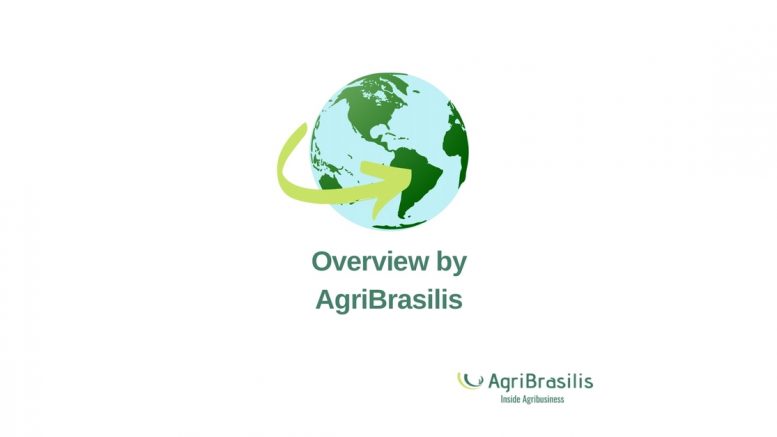Mexico will proceed with the ban on GMO corn until 2024
Lack of dollars in the Central Bank’s coffers worries the agricultural sector, mainly because of lack of pesticides. According to the Agricultural Health and Fertilizers Chamber, there is “a shortage in some brands, for example, in fungicides for treating wheat and barley. There is also a lack of registered products for crops such as rice”. Gustavo Capretto, president of the Federation of Agricultural Inputs Distributors, explained that what is most lacking are latest generation products. “There is already concern from distributors and farmers who cannot find the inputs they used to use and only get the generic ones, because the latest generation is not there…”, alerts Capretto. Among products that are lacking are carboxamides, saflufenacil, atrazine and metolachlor. (BCRA; Fedia; Aapresid)
Drought in Argentina is getting worse, affecting 70% of livestock areas. In most pasture areas, after almost five months without rain, condition of the pastures is very bad, with cows losing physical fitness. Most cows are with newborn calves. According to consultant Ignacio Iriarte, from Federation of Argentine Regional Meat Processing Industries, breeding was also compromised. “There will certainly be a delay in care, and most likely a lower weaning weight next autumn (15 to 20 kg), estimating that if the drought continues for another 30 or 40 days, pregnancy percentages will decrease significantly”, explains Iriarte. (Fifra)
Minister of Economy of Argentina Sergio Massa informs that government is preparing a price freeze plan to contain inflation, that should last for 120 days, between December 2022 and March 2023. According to Massa, price freeze will affect 86% of products considered of mass consumption by the population. Companies that fail to comply with the program can be fined up to US$240 million. (Ministry of Economy)
![]()
Highways across the country have been closed by truck drivers since the victory of Luiz Inácio Lula da Silva in the presidential race was announced. According to data from the Federal Highway Police, there are 47 roadblocks distributed in 11 states, in addition to the Federal District (capital city of Brasília). Manifestations should impact domestic market supply and exports. (TSE; PRF)
Second annual stage of vaccination against foot-and-mouth disease in the State of Minas Gerais begins on November 1st. As established in IMA Ordinance No. 2,132, of March 31st, 2022, bovines and buffaloes of all ages must be immunized. It is expected that 25.7 million animals will be immunized in the state to preserve the health of cattle herds, maintain the current sanitary status of free with vaccination granted by the World Organization for Animal Health, and meet trade commitments with countries that buy Brazilian meat. (OMSA; Minas Gerais Institute of Agriculture)
Ulend, a private credit fintech company based in São Paulo, State of São Paulo, carried out a survey with around 600 customers to assess the time required for agribusiness loans to be paid. Survey indicated that 88% of loans are paid within a period of up to two years. (Ulend)
Chinese customs updates list of approved Brazilian corn exporters, indicating that exports may start soon. List contains 136 grain export facilities, including ADM, Bunge, Cargill, Louis Dreyfus and Cofco International. Brazil also sent Beijing a list of approved facilities to export soybean meal, not yet published by Chinese customs authorities, according to Glauco Bertoldo, director of the Ministry of Agriculture’s inspection department for plant-based products. Large shipments are not expected until the next Brazilian harvest starts in early 2023, according to Craig Turner, of StoneX. (StoneX Consulting; Ministry of Agriculture)

![]()
Reduction in estimated production of cherries by up to 2,000 kg per hectare in some regions because of greater fruit abortion, also called natural thinning. Colder spring, with low temperatures during flowering and fruit growth, is a possible explanation of the phenomenon. (Agrícola San Ricardo)
Authorized trade for 3.6 million strawberry plants of the Monterrey variety after the first application of phosphine by farmers. Strawberry plants were infected with Aphelenchoides fragariae, the strawberry nematode. Number of plants released for trade corresponds to only 7.3% of the more than 52 million infested. (SAG)
Forest fires affect more than 3,500 hectares, mainly in the Agua Fría region, affecting around 3,200 hectares. (Ministry of Agriculture)

Three new predatory mites were discovered to control thrips (insects of the order Thysanoptera) in ornamental plants. Mites Gaeolaelaps aculeifer, Macrocheles robustulus and Parasitus bituberosus, have been especially effective in controlling western flower thrips (Frankiniella occidentalis) in roses. Research identified 95 species of predatory mites in Colombia. “It’s a huge diversity. This made us realize that mites can be inside the farm and in the vegetation they leave outside. This can even help control certain organisms, not just thrips”, according to researcher Diana Rueda Ramírez. (Humboldt University)

Country will proceed with the ban on GMO corn until 2024 and is considering direct agreements with farmers from USA, Argentina and Brazil to guarantee imports of non-GMO yellow corn. USA agricultural organizations say the ban will cause billions of dollars in economic damage to both countries and ask Washington to challenge it through the USA-Mexico-Canada trade pact. Maizall, an international chamber representing the corn sector in Argentina, Brazil and the United States, responsible for more than 80% of global corn exports, says it will not change its corn farming methods to accommodate Mexico. (USMCA; Ministry of Agriculture)


Temperatures are expected to increase in the next few weeks, followed by precipitation over the northeast of the agricultural zone and a strong cold front of polar air, a frequent phenomenon at the end of double episodes of “La Niña”, according to a Capeco report. Central Paraguay will have maximum temperatures above 35°C. Southeast will record maximum temperatures between 30 and 35°C. Most of Paraguayan agricultural areas will receive moderate to very abundant rainfall, between 10 and 75 mm. (Paraguayan Chamber of Exporters and Traders of Cereals and Oilseeds)
![]()
Company Apeel announces a scanner capable of evaluating maturation of avocados. System works by projecting beams of light onto the avocado, that penetrate several millimeters below the surface of the fruit. By collecting data from tens of thousands of avocados from different countries of origin and flowering stages, a sensor was created that measures the amount of light reflected in the visible and near-infrared spectrum. Models for lemons, mangoes and tangerines are also being developed. (Apeel)
Between June and October 25, average price of blueberries at the time of shipment was US$ 5.16/kg, while in the same period of the 2021/2022 campaign it was US$ 5.73/kg, representing a decrease of 10%. Decline is part of a trend of recent years. Analysts point out that this is because of the strong volume of exports from Peru, in addition to the new Mexican supply. (International Blueberry Organization)
Seven new markets are expected to open for agricultural exports by the end of 2023. Closest opening, scheduled for the end of 2022, is the entry of avocados into Malaysia. In the case of some markets, trade opening was planned for 2022, but there were delays. Grapes were expected to be exported to Chile and Japan by the end of the year, but it is now estimated that this will happen in the first quarter of 2023. It is also the case for citrus fruits (oranges, tangerines, grapefruit, lemons) for New Zealand and pitaya for the USA. (Senasa)

Minister of Agriculture Fernando Mattos declares a situation of emergency because of drought and announces that more than US$8.63 million will be released to help farmers with less than 500 hectares. Comparative data from 2021 show that there is a more accentuated water deficit during spring, season when the greatest vegetative development occurs. It is the third consecutive year that it has been decided to declare an agricultural emergency, that in 2021 covered 12 million hectares and more than 1,500 farmers. There was a reduction in the level of groundwater for irrigation, mainly in Montevideo, Canelone and São José. (Ministry of Agriculture)

MORE ABOUT AGRIBUSINESS:

